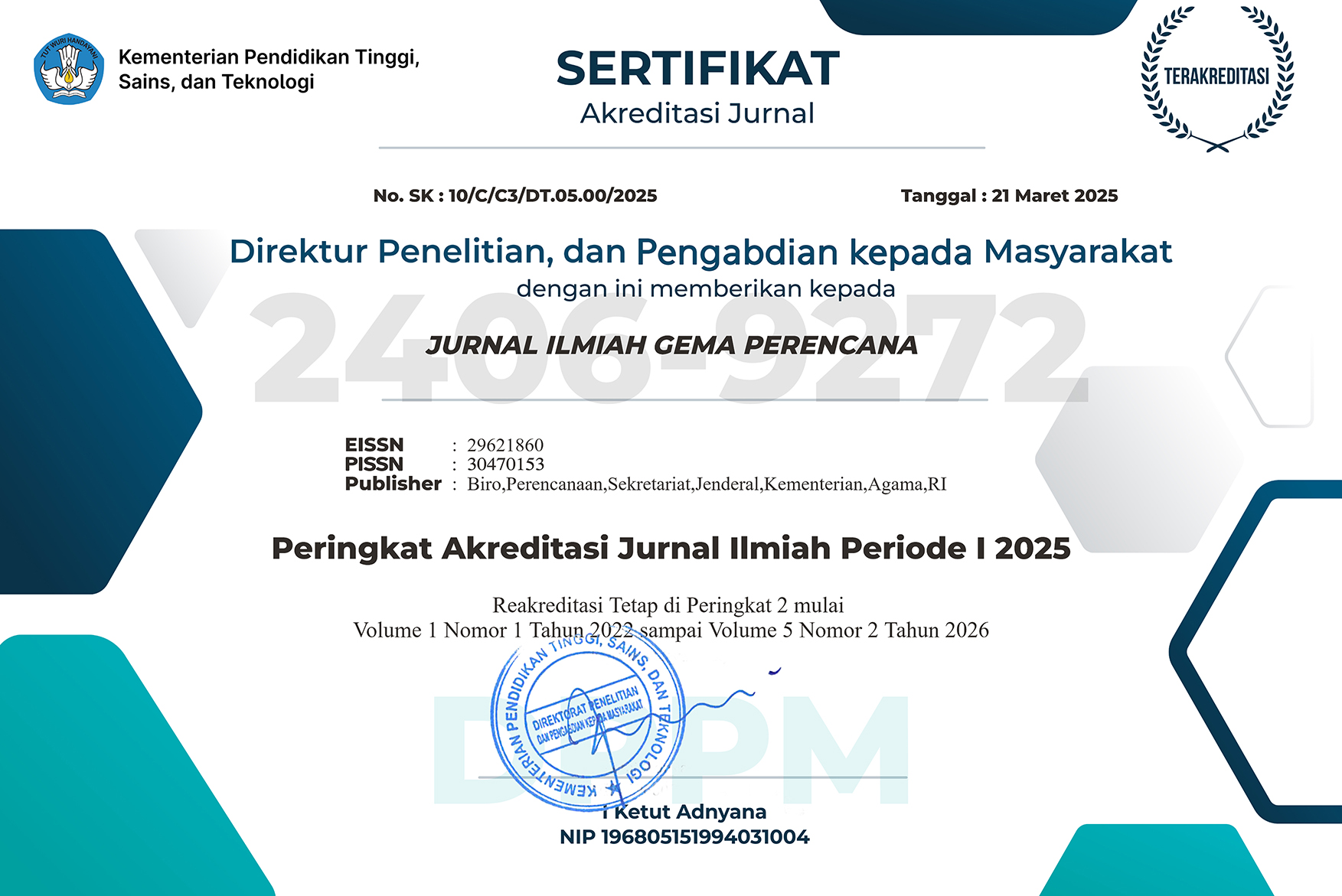Strengthening Confucian Religious Education in Indonesia: SeTiAKIN Bangka Belitung Governance Policy
DOI:
https://doi.org/10.61860/jigp.v4i1.241Abstract
This policy article analyzes standar of the State Confucian Religious College of Indonesia (SeTiAKIN) Bangka Belitung. It posits that optimizing governance is a crucial prerequisite for strengthening Confucian religious education in Indonesia. The primary issues identified are the sub-optimal institutional governance resulting from the absence or incompleteness of internal regulations and Standard Operating Procedures, the availability of qualified human resources (HR), including both lecturers and educational staff, and the lack of mechanisms for regular regulatory review and updates. This situation directly impacts the hindered standardization of educational quality and the limited availability of professional and integral educators and religious counselors.Using a qualitative case study approach, this article explores how these regulatory gaps and weaknesses impede SeTiAKIN's strategic role as a center for Confucian education. The findings indicate that without having robust and adaptive governance framework, the institution struggles to achieve the principles of Good University Governance and fulfill its national policy mandate. Therefore, to address these fundamental problems, this policy article recommends a Minister of Religious Affairs Regulation on General Guidelines for Transparent, Participative, and Accountable Governance of State Religious Higher Education Institutions.
Downloads
References
Bryson, J. M. (2018). Strategic Planning for Public and Nonprofit Organizations: A Guide to Strengthening and Sustaining Organizational Achievement (5th ed.). John Wiley & Sons.
David, F. R., & David, F. R. (2017). Strategic Management: A Competitive Advantage Approach, Concepts and Cases (16th ed.). Pearson.
Fayol, H. (1949). General and Industrial Management. (C. Storrs, Trans.). Sir Isaac Pitman & Sons.
Osborne, D., & Gaebler, T. (1992). Reinventing Government: How the Entrepreneurial Spirit is Transforming the Public Sector. Addison-Wesley. [Buku ini mengadvokasi pemerintah yang adaptif dan tidak terbelenggu oleh aturan usang].
Barney, J. B. (1991). Firm Resources and Sustained Competitive Advantage. Journal of Management, 17(1), 99-120. [Referensi ini penting untuk aspek analisis internal/kapabilitas organisasi].
Kaplan, R. S., & Norton, D. P. (2008). The Execution Premium: Linking Strategy to Operations for Competitive Advantage. Harvard Business Press. [Buku ini membahas bagaimana menerjemahkan visi jangka panjang menjadi tindakan nyata tanpa terjebak hanya pada operasi jangka pendek].
Salmi, J. (2009). The Challenge of Establishing World-Class Universities. The World Bank.
Vroeijenstijn, A. I. (1995). Improvement and Accountability: Navigating Between Scylla and Charybdis. Guide for External Quality Assessment in Higher Education. Jessica Kingsley Publishers.
Peraturan Menteri Pendidikan, Kebudayaan, Riset, dan Teknologi Republik Indonesia Nomor 53 Tahun 2023 tentang Penjaminan Mutu Pendidikan Tinggi.
Hillman, A. J., Cannella, A. A., & Paetzold, R. L. (2000). The Resource Dependence Role of Corporate Directors: Strategic Adaptation of Board Composition in Response to Environmental Change. Journal of Management Studies, 37(2), 235–256.
Pfeffer, J., & Salancik, G. R. (1978). The External Control of Organizations: A Resource Dependence Perspective. Harper & Row.
Pemerintah Indonesia. (2003). Undang-Undang Republik Indonesia Nomor 20 Tahun 2003 tentang Sistem Pendidikan Nasional. Sekretariat Negara.
Tilaar, H.A.R. (2012). Kaleidoskop Pendidikan Nasional: Kumpulan Esai. Penerbit Buku Kompas.
Pemerintah Indonesia. (2020). Peraturan Menteri Pendidikan dan Kebudayaan Nomor 3 Tahun 2020 tentang Standar Nasional Pendidikan Tinggi. [Regulasi ini merupakan salah satu peraturan pelaksanaan utama dari UU Dikti].
Pemerintah Indonesia. (2019). Peraturan Pemerintah Republik Indonesia Nomor 46 Tahun 2019 tentang Pendidikan Tinggi Keagamaan. Sekretariat Negara.
Peraturan Menteri Agama Nomor 2 Tahun 2020 tentang Perubahan atas Peraturan Menteri Agama Nomor 17 Tahun 2018 tentang Akreditasi Program Studi dan Perguruan Tinggi Keagamaan.
Clark, B. R. (1998). Creating Entrepreneurial Universities: Organizational Pathways of Transformation. Pergamon Press.
Middlehurst, R. (2004). Governance in Higher Education: Managing the Process. In Society for Research into Higher Education & Open University Press.
Pemerintah Indonesia. (2012). Undang-Undang Republik Indonesia Nomor 12 Tahun 2012 tentang Pendidikan Tinggi.
Clark, B. R. (1998). Creating Entrepreneurial Universities: Organizational Pathways of Transformation. Pergamon Press.
Middlehurst, R. (2004). Governance in Higher Education: Managing the Process. In Society for Research into Higher Education & Open University Press.
OECD. (2003). Changing Patterns of Governance in Higher Education. OECD Publishing.
Denhardt, R. B., & Denhardt, J. V. (2017). The New Public Service: Serving, Not Steering (4th ed.). Routledge.
Osborne, D., & Gaebler, T. (1992). Reinventing Government: How the Entrepreneurial Spirit is Transforming the Public Sector. Addison-Wesley. [Referensi kunci untuk pendekatan New Public Management].
Weber, M. (1922). Economy and Society. [Karya sosiolog Max Weber yang menjadi dasar bagi teori birokrasi dalam administrasi publik klasik].
DiMaggio, P. J., & Powell, W. W. (1983). The Iron Cage Revisited: Institutional Isomorphism and Collective Rationality in Organizational Fields. American Sociological Review, 48(2), 147–160.
Scott, W. R. (2013). Institutions and Organizations: Ideas, Interests, and Identities (4th ed.). SAGE Publications.
Meyer, J. W., & Rowan, B. (1977). Institutionalized Organizations: Formal Structure as Myth and Ceremony. American Journal of Sociology, 83(2), 340–363.
Dunn, William N. (2018). Public Policy Analysis: An Integrated Approach (6th ed.). Routledge.
Pemerintah Indonesia. (1945). Undang-Undang Dasar Negara Republik Indonesia Tahun 1945.
Pemerintah Indonesia. (1967). Instruksi Presiden Republik Indonesia Nomor 14 Tahun 1967 tentang Agama, Kepercayaan, dan Adat Istiadat Cina.
Pemerintah Indonesia. (2000). Keputusan Presiden Republik Indonesia Nomor 6 Tahun 2000 tentang Pencabutan Instruksi Presiden Nomor 14 Tahun 1967 tentang Agama, Kepercayaan, dan Adat Istiadat Cina.
Pemerintah Indonesia. (2003). Undang-Undang Republik Indonesia Nomor 20 Tahun 2003 tentang Sistem Pendidikan Nasional.
Maulidyah, Z. (2022). Analisis Prioritas Masalah Sanitasi Menggunakan Metode USG (Urgency, Seriousness, Growth). Jurnal Riset Rumpun Ilmu Teknik, 1(2). [Referensi ini menunjukkan aplikasi spesifik metode USG di Indonesia].
Downloads
Published
How to Cite
Issue
Section
License
Copyright (c) 2025 Firman Wahyudi

This work is licensed under a Creative Commons Attribution 4.0 International License.









